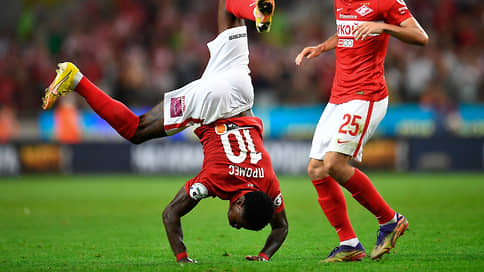Don’t renounce Moscow and prison
[ad_1]

One of the most successful legionnaires in the history of Spartak, Quincy Promes, was sentenced on Monday to a year and a half in prison. The Amsterdam court found him guilty of assaulting his own cousin, who was stabbed as a result of the conflict. The forward’s lawyer said that his client intends to appeal the verdict. If the appeal is not satisfied, Promes, in order to be guaranteed to avoid serving a real sentence, will most likely have to apply for Russian citizenship. Earlier, Spartak had already tried to issue a Russian passport for the Dutchman, but failed. The story of the attack on the cousin is not the most difficult of those that Promes fell into. At home, he is also accused of complicity in drug smuggling.
An Amsterdam court on Monday sentenced Spartak Moscow’s Dutch striker Quincy Promes to 18 months in prison. In addition, Promes was fined €7,000. The verdict was issued in a case that has been under investigation since 2020. Then Promes, at one of the family events, suspected his cousin Esaias of stealing jewelry worth €3,000 from his aunt. The showdown ended with Promes stabbing a relative in the leg. At that time, the football player was already under investigation by the Dutch police in the case of drug smuggling, and therefore all his telephone conversations were tapped. In one of them, he told his father: “It’s good that I don’t carry a gun with me anymore, otherwise it could all end much worse.”
The verdict has not yet entered into force, and therefore Quincy Promes still has the opportunity to challenge it. His lawyer Robert Malevich stated TASSthat Promes will appeal. “He will ask for the annulment of the sentence. Then the High Court of Amsterdam will reconsider the entire case,” said Mr. Malevich.
However, it should be noted that Quincy Promes has long been trying not to leave the Russian Federation, probably for fear of arrest.
He returned to Spartak in 2021 (for the first time, the forward entered the red-and-white camp in 2014, played in Moscow until 2018, after which he managed to play for Sevilla and Ajax), already under investigation. In January 2023, Promes did not fly with the team to the training camp in the UAE, possibly because this country has an extradition agreement with the Netherlands. However, in general, Promes’ travel restrictions are not a problem for Spartak in the current situation. After the start of events in Ukraine, Russian clubs are still excluded from participating in European competitions, so there is no reason for the 31-year-old striker to leave Russia. In addition, the current level of diplomatic relations between Russia and the Netherlands after stories with the Malaysian Boeing 777 and, due to the general crisis in relations with the West, does not contribute to mutual understanding in matters of extradition.
But formally, the Dutch have every reason to request the extradition of their citizen. All questions on this matter could be removed by granting Russian citizenship to Promes (the Constitution of the Russian Federation directly prohibits the extradition of Russian citizens to foreign states).
Spartak has already tried to secure its valuable asset with a Russian passport, but has not succeeded. In March, the press service of the red-whites reported that the club intended to advance the issue of obtaining Russian citizenship by Promes through the Ministry of Sports of the Russian Federation, but was refused assistance.
The decision of the department was connected precisely with the criminal trials that were going on in the Netherlands with the participation of the player. After all, the story of an aunt, a cousin, and a stolen necklace is far from the most remarkable in the list of those accused by Quincy Promes. At the end of May, the Dutch prosecutor’s office, as reported by the portal AD.nl, charged Promes with complicity in drug smuggling. According to the prosecution, Promes committed the acts incriminated to him back in 2020. Then, in the port of Antwerp, two consignments of cocaine weighing 720 kg and 650 kg (1370 kg in total) were intercepted. Under Dutch law, smuggling of hard drugs is a serious crime and is punishable by imprisonment for a term of 12 to 16 years.
[ad_2]
Source link









